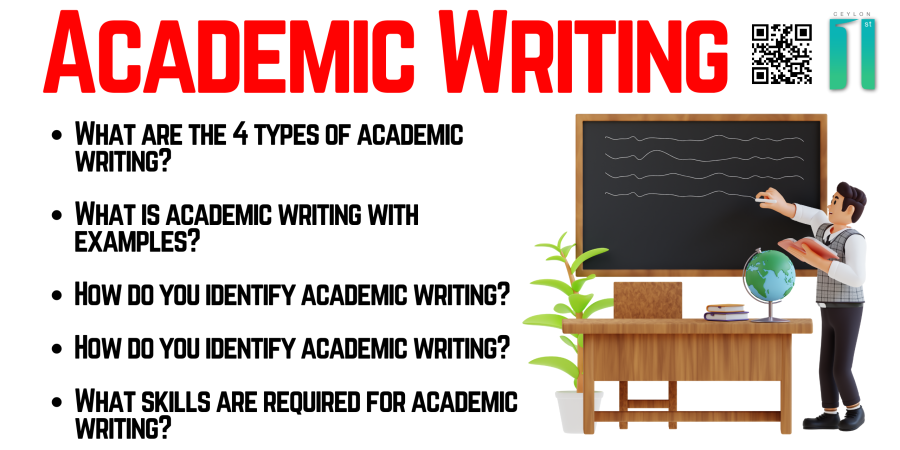Academic writing is a formal style of writing commonly used in educational and research settings. It is characterised by its structured and well-organized approach, clarity, objectivity, and a focus on conveying information and arguments in a clear and precise manner. Here are some key features and tips for academic writing:
- Clarity and Precision: Academic writing should be clear and concise. Use straightforward language and avoid jargon, colloquialisms, and ambiguity. Your goal is to convey your ideas and findings as clearly as possible.
- Formal Tone: Maintain a formal and objective tone in your writing. Avoid first-person pronouns (I, me, we) and use third-person (he, she, it, they) or passive voice instead. This helps to maintain objectivity and focus on the content.
- Structured Format: Academic papers typically follow a structured format, such as an introduction, literature review, methodology, results, discussion, and conclusion. This structure helps readers navigate your work.
- Thesis Statement: Clearly state your thesis or the main argument of your paper in the introduction. This provides a roadmap for your readers and helps them understand the purpose of your work.
- Citing Sources: Properly cite all sources using a standardized citation style (e.g., APA, MLA, Chicago, or others). This is crucial to give credit to the original authors and to avoid plagiarism.
- Evidence and Data: Support your claims and arguments with evidence and data. Use reputable sources and provide citations to back up your statements. Quantitative data and qualitative evidence can both be essential, depending on your field.
- Critical Thinking: Engage in critical thinking and analysis. Evaluate the strengths and weaknesses of different arguments and pieces of evidence. Discuss counterarguments and show a deep understanding of the topic.
- Logical Flow: Ensure that your writing has a logical flow, with smooth transitions between paragraphs and sections. Each paragraph should have a clear topic and connect logically to the next.
- Academic Vocabulary: Use appropriate academic vocabulary to express your ideas. However, don’t use overly complex words when simpler ones will suffice. Clarity should always be the priority.
- Revision and Proofreading: Academic writing often requires multiple drafts. Revise and proofread your work for errors in grammar, punctuation, spelling, and clarity. It’s often helpful to have someone else review your work as well.
- Audience Awareness: Consider your target audience when writing. Are you addressing experts in your field or a general academic audience? Tailor your writing style and level of technical detail accordingly.
- Avoid Plagiarism: Always give proper credit to the original sources when using someone else’s work or ideas. Plagiarism is a serious academic offense.
- Consistency: Maintain consistency in formatting, citation style, and terminology throughout your paper.
- Conciseness: Avoid unnecessary repetition and wordiness. Be concise and get to the point without sacrificing clarity.
- Purposeful Title: Choose a title that accurately reflects the content and purpose of your work. A well-crafted title can draw readers’ attention.
Remember that different academic disciplines and types of documents (e.g., research papers, essays, reports) may have specific conventions and requirements, so it’s essential to familiarize yourself with the expectations of your particular field and assignment. Academic writing is a skill that improves with practice and feedback, so don’t be discouraged by initial challenges and keep refining your abilities over time.
What are the 4 types of academic writing?
Academic writing encompasses a wide range of genres and styles, but it can generally be categorised into four main types:
- Descriptive Writing: Descriptive writing aims to provide a detailed and vivid account of a person, place, event, or object. It often involves using sensory details to create a clear mental image for the reader. This type of writing is common in fields like literature, geography, and art history.
- Expository Writing: Expository writing is informative in nature and is focused on explaining or presenting information, facts, or ideas in a clear and organized manner. It may include analysis, but the primary goal is to inform the reader. Academic essays, research papers, and textbooks often fall into this category.
- Persuasive Writing: Persuasive writing is designed to convince the reader to adopt a specific viewpoint or take a particular action. It involves making arguments, presenting evidence, and logically reasoning to persuade the audience. Persuasive essays, argumentative research papers, and position papers are examples of this type of writing.
- Analytical Writing: Analytical writing involves a critical examination and interpretation of a subject. It goes beyond presenting information and aims to explore the underlying meaning, significance, or relationships within a topic. Critical reviews, literary analyses, and case studies are common forms of analytical writing.
These categories are not mutually exclusive, and academic writing often combines elements of these four types. The specific type of academic writing you’ll encounter or need to produce depends on the purpose of the assignment, the subject matter, and the expectations of your instructor or the conventions of your academic field. It’s important to understand the requirements of your specific writing task and adapt your approach accordingly.
What is academic writing with examples?
Academic writing encompasses a variety of genres and styles, and the type of academic writing you engage in depends on the specific assignment or academic discipline.
Here are some examples of academic writing along with brief explanations:
- Research Paper: Research papers are a common form of academic writing where you investigate a particular topic, present your findings, and support your arguments with evidence from scholarly sources. For example, a research paper on climate change might discuss the causes, effects, and potential solutions to this global issue.
- Essay: Academic essays come in various forms, including descriptive, expository, persuasive, and analytical essays. For instance, a persuasive essay on the importance of vaccinations could argue for the necessity of immunization in public health.
- Literature Review: A literature review provides an overview and analysis of existing research on a particular topic or question. It synthesizes and discusses relevant studies and identifies gaps or areas for future research. An example might be a literature review on the effects of social media on mental health.
- Lab Report: In scientific disciplines, lab reports are common. These reports detail experiments or research conducted in a laboratory, including methodologies, data, and interpretations of results. A lab report on a chemistry experiment might outline the procedure and report the outcomes and observations.
- Dissertation or Thesis: A dissertation or thesis is a long, in-depth academic document typically required for advanced degrees. It involves original research and a comprehensive examination of a specific subject. For example, a doctoral thesis in psychology might explore the impact of early childhood experiences on adult mental health.
- Annotated Bibliography: An annotated bibliography is a list of sources with brief summaries and evaluations of each source’s quality and relevance. It is often used as a preliminary step in research projects. For instance, an annotated bibliography on the American Civil Rights Movement could provide summaries and assessments of key texts on the topic.
- Case Study: Case studies involve an in-depth examination of a particular case, often in fields like psychology, business, or medicine. For example, a medical case study might explore a rare disease’s diagnosis and treatment.
- Academic Book Review: Book reviews in academic writing involve an analysis and critique of a scholarly book or monograph. The review assesses the author’s arguments, the book’s contributions to the field, and its potential limitations. An academic book review might discuss a recent publication on the history of a specific time period.
- Academic Report: Academic reports are used to present research findings, data analysis, or information in a structured and organized manner. For instance, a report on an environmental impact assessment might detail the findings of a study regarding the potential ecological effects of a construction project.
These are just a few examples of academic writing. Academic writing varies across disciplines, and each type serves different purposes and follows specific conventions. It’s essential to understand the expectations and requirements of your particular assignment or field when engaging in academic writing.
How do you identify academic writing?
Identifying academic writing involves recognising the distinctive characteristics and features typically associated with scholarly or formal writing.
- Formal Language and Style: Academic writing generally employs a formal and objective tone. It avoids slang, colloquialisms, and overly casual language. Instead, it uses precise vocabulary and a more serious demeanor.
- Citations and References: Academic writing relies on citations and references to acknowledge the sources of information and ideas. Citations follow a specific citation style (e.g., APA, MLA, Chicago), and references are listed in a bibliography or reference section.
- Structured Organization: Academic writing often follows a structured format, such as an introduction, literature review, methodology, results, discussion, and conclusion. The organization is logical, with clear section headings and transitions.
- Objective and Third-Person Perspective: Academic writing typically avoids using the first person (I, me) and emphasizes objectivity. It may use the third person (he, she, they) or passive voice to create a sense of detachment from the author.
- Clarity and Precision: Academic writing prioritizes clarity and precision. It conveys information and ideas clearly, avoiding ambiguity and unnecessary complexity. Technical terms are used with precision.
- Evidence and Research: Academic writing is based on evidence and research. It presents arguments and claims supported by data, evidence, and citations from reputable sources. It values critical thinking and logical reasoning.
- Audience Awareness: Academic writing is tailored to a specific audience, often experts or scholars in a particular field. It assumes a level of knowledge and familiarity with the subject matter.
- Complex Sentence Structure: Academic writing often uses complex sentence structures and a variety of sentence types to convey nuanced ideas. It may incorporate subordinate clauses and technical terminology.
- Avoidance of Personal Opinion: While critical analysis is encouraged, personal opinion and emotional language are generally minimized in academic writing. Arguments are supported by factual evidence and analysis.
- Use of Disciplinary Conventions: Different academic disciplines may have specific conventions and expectations for writing style and formatting. Academic writing conforms to the norms of the relevant field.
- Thesis or Research Question: Academic writing often begins with a clear thesis statement or research question that guides the entire work. The paper aims to address, explore, or answer this central point.
- Length and Depth: Academic writing can be more extensive and in-depth compared to casual writing. Research papers, dissertations, and scholarly articles often provide a comprehensive examination of a topic.
- Peer Review: Academic writing in journals or scholarly publications typically undergoes a peer review process, where experts in the field evaluate the quality and validity of the work before publication.
These characteristics may vary slightly depending on the specific field or assignment, but they provide a good starting point for identifying academic writing. When in doubt, consider the context in which the writing is presented and whether it adheres to the conventions of formal, scholarly communication.
What are four things to avoid in academic writing?
In academic writing, there are several things you should avoid to maintain the quality, clarity, and professionalism of your work.
Here are four key things to steer clear of:
- Plagiarism: Plagiarism is a serious academic offense and should be strictly avoided. Always give proper credit to the original sources of information, ideas, and quotations. Use appropriate citation styles, such as APA, MLA, or Chicago, and ensure that you clearly distinguish between your words and the words of others. Properly paraphrase and cite when using someone else’s work, and use quotation marks for direct quotes.
- Bias and Subjectivity: Academic writing should be objective and avoid personal bias or subjective language. Avoid using first-person pronouns (I, me) and maintain an impartial and neutral tone. Present arguments and evidence based on data and analysis rather than personal opinion.
- Ambiguity and Lack of Clarity: Academic writing should be clear and precise. Avoid vague or ambiguous language that can confuse readers. Use concrete examples, define terms when necessary, and structure your writing logically. If your readers cannot easily understand your points, it weakens your argument.
- Overly Informal Language: Maintain a formal tone in academic writing. Avoid using slang, colloquial language, or overly casual expressions. Academic writing should reflect a level of professionalism and seriousness. Use appropriate academic vocabulary and terminology, but balance it with clarity and accessibility to your intended audience.
In addition to these four points, you should also avoid other common writing issues, such as spelling and grammatical errors, poor organisation, excessive repetition, and unsupported claims. Careful proofreading and revision can help you identify and rectify these issues. It’s important to follow the specific guidelines and expectations of your institution or academic discipline to produce high-quality academic writing.
What skills are required for academic writing?
Academic writing requires a combination of skills to effectively communicate your ideas, research findings, and arguments in a scholarly and professional manner.
- Research Skills: The ability to locate, evaluate, and use credible sources is fundamental in academic writing. You should be skilled at finding relevant books, articles, and other academic materials in libraries and online databases.
- Critical Thinking: Academic writing demands critical thinking skills. You should be able to analyze information, assess the strengths and weaknesses of arguments, and draw well-reasoned conclusions.
- Organization: Academic writing requires strong organizational skills to structure your work logically. You must be able to outline your ideas, create a clear thesis statement, and organize your content into coherent sections and paragraphs.
- Grammar and Style: A strong command of grammar, punctuation, and writing style is crucial. This includes using proper sentence structure, word choice, and maintaining consistency in formatting and citation styles (e.g., APA, MLA, Chicago).
- Clarity and Conciseness: Academic writing should be clear and concise. You need the ability to convey complex ideas in a straightforward manner and avoid unnecessary wordiness or jargon.
- Citation and Referencing: You should understand and be able to apply the rules of citation and referencing in various academic styles (e.g., APA, MLA, Chicago). This includes in-text citations and creating a bibliography or reference list.
- Paraphrasing and Summarizing: The skill to paraphrase or summarize source material accurately while avoiding plagiarism is essential. You should be able to distill information from sources and present it in your own words.
- Audience Awareness: You need to consider your target audience when writing. Are you addressing experts in your field, peers, or a general academic audience? Adapt your writing style and level of technical detail accordingly.
- Time Management: Academic writing often involves multiple drafts and revisions. Good time management skills will help you allocate sufficient time for research, writing, editing, and proofreading.
- Literature Review: The ability to conduct a thorough literature review is crucial for understanding existing research on your topic and identifying gaps in the literature.
- Argumentation: Academic writing often involves constructing and presenting persuasive arguments. You should be able to develop a clear thesis or research question and support it with evidence and logical reasoning.
- Reading Skills: Strong reading skills are essential to comprehend and synthesize complex academic texts. This includes the ability to identify the main points and arguments in scholarly articles and books.
- Proofreading and Editing: The ability to review your work for errors in spelling, grammar, and style is crucial for producing a polished final product.
- Adaptability: Academic writing varies across disciplines and can take various forms, so being adaptable and able to learn the specific conventions of your field is important.
- Ethical Awareness: An understanding of academic ethics, including avoiding plagiarism and giving proper credit to sources, is vital for maintaining integrity in academic writing.
Remember that academic writing is a skill that can be developed and improved over time with practice, feedback, and attention to the specific requirements of your academic field or discipline.
CEYLON FIRST



Leave feedback about this